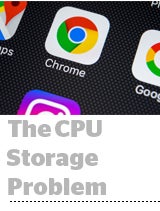 Chrome said Thursday that it will start limiting the data and computing resources a display ad can use before the ad will be considered abusive and is blocked.
Chrome said Thursday that it will start limiting the data and computing resources a display ad can use before the ad will be considered abusive and is blocked.
Chrome product manager Marshall Vale wrote in a blog post that the decision will “save our users batteries and data plans.” Read the post.
This announcement targets specific corner cases in online advertising. The blog post calls out ads that mine cryptocurrency as particularly greedy bandwidth consumers. Display ads that double as mini-games also eat up a disproportionate share of data.
Only 0.3% of all online display ads would meet the criteria, but that fraction of a percent consumes 27% of network data and 28% of CPU usage, according to Google data.
When an ad crosses the data consumption threshold – which Google has not set yet – the frame will display an error message and users could click on an alert to see why the ad was blocked. Chrome will experiment with this change over the summer, and plans to roll it out to browser updates by September, Vale said.
Some Google skeptics worry that this announcement could presage broader strokes by Chrome to limit data consumption, such as a news site that uses interactive visuals and other resource-heavy editorial content.
The plan to block data-slurping ads on Chrome isn’t being announced in a vacuum.When Chrome deprecates third-party cookies in 2022, Google is proposing to move the ad auction logic and decision-making from outside servers (controlled by exchanges, SSPs, publishers, etc.) to the Chrome browser. This would help preserve the identity of browser users, since ad tech companies would never directly access impression data.
Ad tech companies are trying to shift Google from that position, because servers can use as much as data as ad exchanges need, whereas browsers are limited by someone’s cell service or the storage available on their phone. Companies won’t be able to use complex auction logic, and could end up erroring out of ad opportunities, especially with heavier video ad formats.













